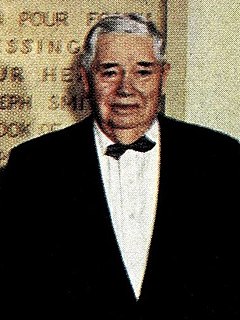A Quote by Bruce Schneier
It is sort of interesting that in our society this days we are very quick to apply the term 'war' to places where thare are no actual wars, and loath to apply the term 'war' when we are actually fighting wars.
Related Quotes
The thing that I learned early on is you really need to set goals in your life, both short-term and long-term, just like you do in business. Having that long-term goal will enable you to have a plan on how to achieve it. We apply these skills in business, yet when it comes to ourselves, we rarely apply them.
But, like all metaphoric wars, the copyright wars are not actual conflicts of survival. Or at least, they are not conflicts for survival of a people or a society, even if they are wars of survival for certain businesses or, more accurately, business models. Thus we must keep i mind the other values or objectives that might also be affected by this war. We must make sure this war doesn't cost more than it is worth. We must be sure it is winnable, or winnable at a price we're willing to pay.
We've gotten into this - this mindset of fighting politically correct wars. There is no such thing as a politically correct war. The left, of course, will say Carson doesn't believe in the Geneva Convention, Carson doesn't believe in fighting stupid wars. And - and what we have to remember is we want to utilize the tremendous intellect that we have in the military to win wars.
Not only does the Charter Organization not prevent future wars, but it makes it practically certain that we shall have future wars, and as to such wars it takes from us the power to declare them, to choose the side on which we shall fight, to determine what forces and military equipment we shall use in the war, and to control and command our sons who do the fighting.
All American wars (except the Civil War) have been fought with the odds overwhelmingly in favor of the Americans. In the history of armed combat such affairs as the Mexican and Spanish-American Wars must be ranked, not as wars at all, but as organized assassinations. In the two World Wars, no American faced a bullet until his adversaries had been worn down by years of fighting others.
The casualties in the Civil War amount to more than all other wars - all other American wars combined. More people died in that war than World War II, World War I, Vietnam, etc. And that was a war for white supremacy. It was a war to erect a state in which the basis of it was the enslavement of black people.
"The War on Consciousness" is really all physical manifestations and all those problems are ultimately just a war on your way of thinking. Especially now, when we're involved in the war on terror. Terror is a psychological term. Terrorism is a political term. Terrorist is a sociopolitical term. But terror is a psychological thing.
Is it not tragic, for example, that while in the last World War almost everyone believed it was the war to end all wars and wanted to make it so, now in this Second World War almost no writer that I have read dares even suggest that this is the war to end all wars, or act on that belief? We have lost the courage to hope.
And always we had wars, and more wars, and still other wars - all over Europe, all over the world. "Sometimes in the private interest of royal families," Satan said, "sometimes to crush a weak nation; but never a war started by the aggressor for any clean purpose - there is no such war in the history of the race."





































